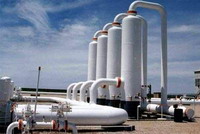Russia's gas monopoly states 40 percent increase over current gas prices
Ukraine will pay nearly US$180 (122 EUR) per thousand cubic meters of Russian natural gas beginning next year.

The deal comes after months of negotiations between Moscow and Kiev and is part of what Russia describes as an effort to end its practice of providing energy supplies to former Soviet republics at cut-rate prices. That effort escalated into a full-blown dispute two years ago, during which Russia cut supplies to Ukraine.
The dispute affected some European countries farther along the export pipeline and raised worries about Russia's reliability as Europe's main energy supplier.
OAO Gazprom said in a statement that, under the deal signed by Gazprom CEO Alexei Miller and Ukrainian Energy Minister Yury Boiko, Ukraine had agreed to pay US$179.50 (121.70 EUR) per thousand cubic meters beginning in 2008. It also said transit prices would be set at US$1.70 (1.15 EUR), the same transit price for gas shipping across Russian territory.
Ukraine currently pays US$130 (88.19 EUR) per thousand cubic meters of gas imported from Russia.
Nearly all the gas Ukraine uses is imported through via Russia from the energy-rich Central Asian nation of Turkmenistan. The gas is imported through a Swiss-based trading company, RosUkrEnergo, half of which is owned by Gazprom and half by two Ukrainian businessmen.
RosUkrEnergo spokesman Andrei Knutov said no official documents had been signed, but that was expected to happen in the coming days.
Meanwhile, Yulia Tymoshenko, the fiery opposition leader who is poised to return to her post as Ukraine's prime minister, lambasted the deal and vowed to eliminate middleman companies in negotiating energy deals.
"This is a result of an absolutely brainless policy of setting up RosUkrEnergo as a broker," she was quoted as saying by Interfax.
"There is no logic here. This is corruption," she was quoted as saying. "Undoubtedly, if our team comes to power, we will do all we can so that Ukraine and Russia have the opportunity to work without any go-betweens."
Since the January 2006 supply disruption and a similar incident involving oil shipped across Belarus, Russia has sought to assure the European Union that export supplies would not be affected.
In October, Russia urged Ukraine to make good on what it said was a US$1.3 billion (890 million EUR) debt for gas shipments, a demand some Ukrainian officials described as an attempt to exert influence on Ukrainian politics after September's parliamentary elections.
The deal comes one week after Gazprom announced it would pay up to 50 percent more beginning next year for natural gas from Turkmenistan. The increased price that Russia will pay for Turkmen gas was seen as a concession by Moscow in an effort to spur Turkmenistan to speed up construction of a Caspian shoreline pipeline.
The new pipeline system could give Moscow yet more control over Turkmen gas exports.
Subscribe to Pravda.Ru Telegram channel, Facebook, RSS!


